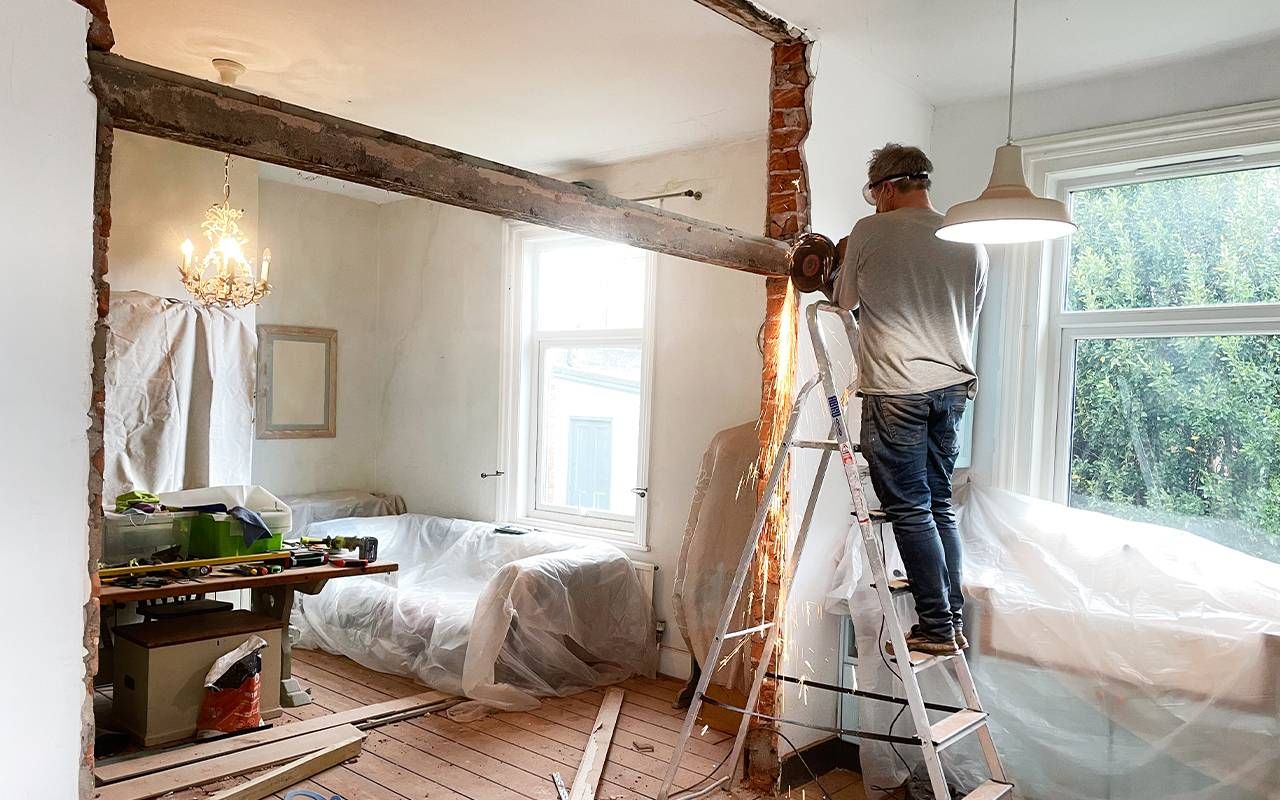Beware of Fixer-Uppers
You’re retired and you have time to burn, but that doesn’t mean you should renovate an old house
If you're retired — with plenty of free time — you may be on the hunt for your next great adventure. And if you watch TV on a regular basis, you've probably seen numerous DIY/fixer-upper shows in which buyers purchase a run-down or outdated house and turn it into a dream home. Sounds like fun but is it realistic — especially for older adults?

"As a Realtor, a senior and someone who has bought many fixer-uppers over the years, this question hits home for me," says Bill Golden, an associate broker at Keller Williams Realty in Atlanta.
"The last thing most older people want is the hassle and inconvenience of moving and setting up a new home that will invariably involve some construction...."
When he was younger, Golden says he enjoyed buying fixer-uppers and getting his hands dirty. "But at this stage in my life," he adds, "I'm realistic enough to know that I can't really do much of the work myself, and if I do, it's going to take way more time than I anticipated."
The alternative is to hire contractors to handle everything, which significantly adds to the cost.
Frederick Warburg Peters, a broker at Coldwell Banker Warburg in New York, is even more dismissive of the romance of rehabbing an old home.
"Surely this is obvious!" he says. "The last thing most older people want is the hassle and inconvenience of moving and setting up a new home that will invariably involve some construction, planning, stress, time, etc."
In general, Warburg Peters says retirement should be free of this sort of worry.
However, some older adults may consider fixing up an aging home to be an exciting and fulfilling project that can provide an excellent return on investment. Next Avenue consulted with a range of professionals with experience in the field. Following are some of the factors they recommend weighing before you decide to purchase a fixer-upper house.
The Stress Test
Regardless of your age, our experts agree that buying a fixer-upper is not for the faint of heart. Jane Katz, an agent at Coldwell Banker Warburg in New York, reiterates Warburg Peters' belief that older adults want to live calm — not stressful — lives.
"Renovating a fixer-upper requires a very agile temperament — and wealth — for the unanticipated extras," she says.
"Overseeing and/or being the bill payer of a fixer-upper requires a calm personality and the ability to deal with the unexpected," she says, noting that homeowners often must make quick and costly decisions about unforeseen problems.
And here's something else to consider: "If the extra money required for a sudden fix has to come out of the person's nest egg, that's an additional stressor," she warns.
However, Mihal Gartenberg, a broker at Coldwell Banker Warburg in New York City, says she believes a fixer-upper can be a great idea for the right buyer. "It can be a stressful but also fun process," she says, "and if you're the type of person who enjoys having projects around the house, and that keeps you young in body and mind, then buying a fixer-upper can be a lot of fun and a great investment over time."
Time and Money Factors
Fixer-upper houses can be purchased at a discount, which is an important consideration if you're trying to get into a good neighborhood without spending a fortune.
"A huge benefit of purchasing a fixer-upper is the decreased interest in the property, making it easier to negotiate a better deal, not to mention the equity gained when the home renovation is completed," says Jason Gelios, a Realtor at Community Choice Realty in Detroit.
However, he says a lot of issues can arise that weren't visible during a home inspection.
"I always advise my courageous home buyers to add a cushion in their renovation budget when considering a fixer-upper."
"Once you tear down walls or remove things, some issues come to surface," Gelios says, "This is why I always advise my courageous home buyers to add a cushion in their renovation budget when considering a fixer-upper."
Also, keep in mind that the reason you can buy a fixer-upper at a discount is because fixing it up requires so much work. "These homes in particular can cost more in the long run both financially and in terms of time," says John Manasco, chief operating officer at Stone Martin Builders in Montgomery, Alabama. "And even though you might be able to live in a fixer-upper, you will have to spend a lot of time and money making structural and/or aesthetic improvements."
Whether you plan to do the renovations yourself, or with partial or full assistance, Golden warns that you will be putting in a significant amount of physical effort for an extended period of time. "You will lose a lot of your free hours and weekends to complete your home," he says.
Time and money factors alone can create an emotional toll on homeowners.
"It is hard to live in a home that is currently being constructed — and that's with things going as planned," says Matt Aaron, a wealth management advisor at Northwestern Mutual in Washington, D.C. "Almost nothing ever follows a plan completely, so a fluctuating budget and unplanned maintenance work are obstacles to keep in mind."
You may start out thinking you can put up with the dust, noise and other construction sights and sounds for six weeks, but what happens when the timeline is extended to 12 weeks? Or you may decide during week one that living in the house during construction is unbearable. Now, you'll need to contend with other additional costs if you decide to live in a hotel until the work is complete.
Some people may have no choice but to move out. "Even inhaling dust and paint fumes from a renovation can be dangerous for older people," warns Gerard Splendore, a broker at Coldwell Banker Warburg in New York. "And for DIYers, a project as simple as painting a bathroom can lead to back pain and frustration."
Materials and Labor
In a "perfect" pre-pandemic era, contractors and suppliers didn't always meet their deadlines. But now, time estimates stretch much longer because of increased demand and reduced supply of almost everything.
"Since the pandemic, the Great Resignation and last year's housing boom, everyone is trying to renovate, which means materials and experienced pros are in short supply," Golden says. "Too, the supply chain is still massively backlogged, meaning some items you may want or need are simply not available."
"Everyone is trying to renovate, which means materials and experienced pros are in short supply."
His view is shared by Steve Schwab, founder and CEO of Casago, a property management company in Scottsdale, Arizona.
"Although time may be a resource that is abundant in life as a retiree, you will find that navigating the housing market is especially difficult given the current economic climate," he says. "Within the current housing market there is a significant lack of equipment and labor — and the housing market is also plagued by rising fees with no projected alleviation in the near future."
In fact, Schwab points to a 2021 National Association of Home Builders report, which found that shortages of materials were the most widespread since the organization began tracking this issue in the 1990s. (These shortages included framing lumber, appliances and oriented strand board).
Rising Costs on a Fixed Income
"As a result of this persistent volatility, it is difficult to anticipate the total cost and estimated completion time of a project such as a fixer-upper," he says.
Unpredictable costs can be quite risky for people on a fixed income.
"In addition to unforeseen conditions as a result of opening up walls and floors, there's also scope creep, which occurs when the homeowners cannot resist either adding to the scope or changing their mind once they see something installed," says agent Kate Wollman-Mahan of Coldwell Banker Warburg in New York. "In addition, there may be change orders from work that was left out of the contractor's estimate and the homeowner didn't catch it."
Dubious Contractors
Another factor to consider: finding an honest contractor to work with. "Dubious contractors take advantage of older people, increasing prices at their whim or taking deposits and disappearing," warns Splendore.
While Golden says that he doesn't see himself renovating any more fixer-uppers, he acknowledges it might be a good idea for some people.
"If you have all the resources available to you and the time to get it done, you may enjoy buying a fixer-upper — but it's vital that you consider all the factors realistically before you dive into the deep end," he says. "If you do go down that road, build a schedule that accommodates unforeseen delays and a budget that includes a line item for contingencies."


